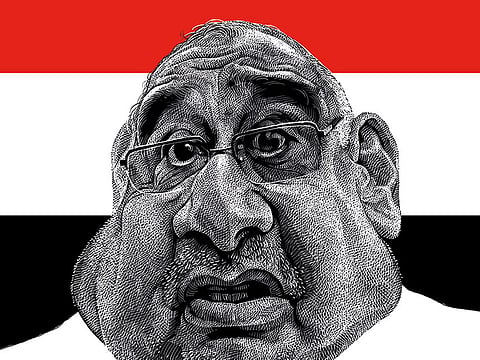A man for all seasons
There is hope that the new Iraqi Prime Minister will set in motion a process to unite the country, whose social fabric has been torn apart by years of war, terrorism and sectarianism

On October 3, Iraq’s newly appointed President, Barham Salih, chose the independent Shiite politician Adel Abdul Mahdi to be the next prime minister and form a government. In doing so, Salih ensured that both the presidency and premiership in the troubled country went to the hands of technocrats.
Given his reputation for getting along with politicians of all stripes and, crucially, his acceptability to the two main power brokers in Iraq — Tehran and Washington — the hope was that Abdul Mahdi would set in motion a process to unite the country, whose social fabric had been torn apart by years of sanctions, war, foreign occupation, terrorism, sectarianism and limitless corruption.
Abdul Mahdi emerged as a compromise candidate at a time when the United States was hoping to see the incumbent, Haidar Al Abadi, become the prime minister, and Iran had placed its bets on former premier Nouri Al Maliki, or the powerful Shiite paramilitary leader Hadi Al Ameri.
On October 24, after an unruly session in parliament, the Iraqi members of parliament rejected Abdul Mahdi’s key Cabinet picks. The session ended after midnight with Abdul Mahdi sworn in as Prime Minister, but with only 14 Cabinet members approved, out of a total 22 presented by the PM. This will ensure that the political wrangling that ensued after the inconclusive parliamentary elections in May is likely to continue.
Unlike all other prime ministers in post-Saddam Hussain Iraq, Abdul Mahdi, 76, is not a member of the Shiite Islamist Dawa party. He has his roots in the Supreme Iraqi Islamic Council. An economist by training, he had previously served as one of the vice-presidents of Iraq, from 2005 to 2011. He was also a former finance minister in the so-called interim government of Iraq (2004 to 2005) and was oil minister from 2014 to 2016.
His father was a respected Shiite cleric. Abdul Mahdi went to school at Baghdad College, an elite American Jesuit secondary school.
He went into exile in France in 1969 and speaks fluent French. While in France, he edited Arabic and French magazines, and worked at think tanks.
Abdul Mahdi was not always an Islamist. In fact, he has a background in the Iraqi Communist Party in the 1970s. When the party’s “Central Committee” became more accommodative of the ruling military junta, Abdul Mahdi moved to the so-called Central Leadership of the party, which advocated a more radical position against “anti-progressive” forces.
However, by the early 1980s, Abdul Mahdi found himself gradually drifting towards the Islamist ideals that were being promoted at that time by the revolutionary regime of Ayatollah Khomeini in Iran, who destroyed the Communists in that country. By the mid 1980s, Abdul Mahdi was a devoted member of the Supreme Council for the Islamic Revolution in Iraq.
The sectarian struggle
An unwritten rule in Iraq’s post-Saddam era holds that the president must be a Kurd, the prime minister a Shiite and the speaker of parliament a Sunni. The idea was to ensure that each segment of Iraqi society got a stake in the running of the country. But it has done nothing to suppress the sectarian struggle for key ministries, such as defence and interior. After the partial formation of the government last Wednesday, the defence and interior ministers and six others have yet to be decided. It is clear that until this matter is settled, the new government cannot begin to address the daunting challenges.
“It’s hard to see how if the big political parties demand posts — which they view as their livelihood — could just be excluded,” said Renad Mansour, research fellow at Chatham House in London. Abdul Mahdi and President Salih “are going to face a lot of pressure — we’ve seen that in the appointment process”, he said.
Parliament is due to vote again on November 6 to approve the remainder of the 22-member Cabinet, proposed by the prime minister. He currently has 14 ministers, and said on Thursday that a complete cabinet would soon be in place.
With its unimaginable oil wealth and talented population, Iraq should have resembled prosperous countries in the region such as the UAE or Kuwait. Instead, we have a situation where the lack of basic amenities and the scale of corruption are so acute that the country finds itself at the bottom of all major quality-of-life indices.
Demanding public services
A case in point is the situation in Basra. This city that is so central to the golden age of Islamic civilisation is quite literally collapsing, with polluted rivers and near-total lack of electricity. Dozens of unarmed protesters in this city, which is also part of Iraq’s Shiite heartland, have been shot dead by security forces for merely demanding public services from an immensely corrupt political class that seems more and more detached from the average Iraqi.
Iraq has innumerable issues to deal with; the country is broken at every level. But the years from 2014 to 2017 were nightmarish even by Iraqi standards. The Daesh terror group swept across large parts of the country, humiliated the Iraqi army and brought almost a third of the country under its draconian rule. A war of untold brutality ensued as the Iraqi forces gathered around to defeat the group and retake territory.
For these three years, solving all of the country’s other problems was put on the back burner. But now, as Iraq begins to rebuild, the scale of the task facing the new prime minister is there for all to see.


